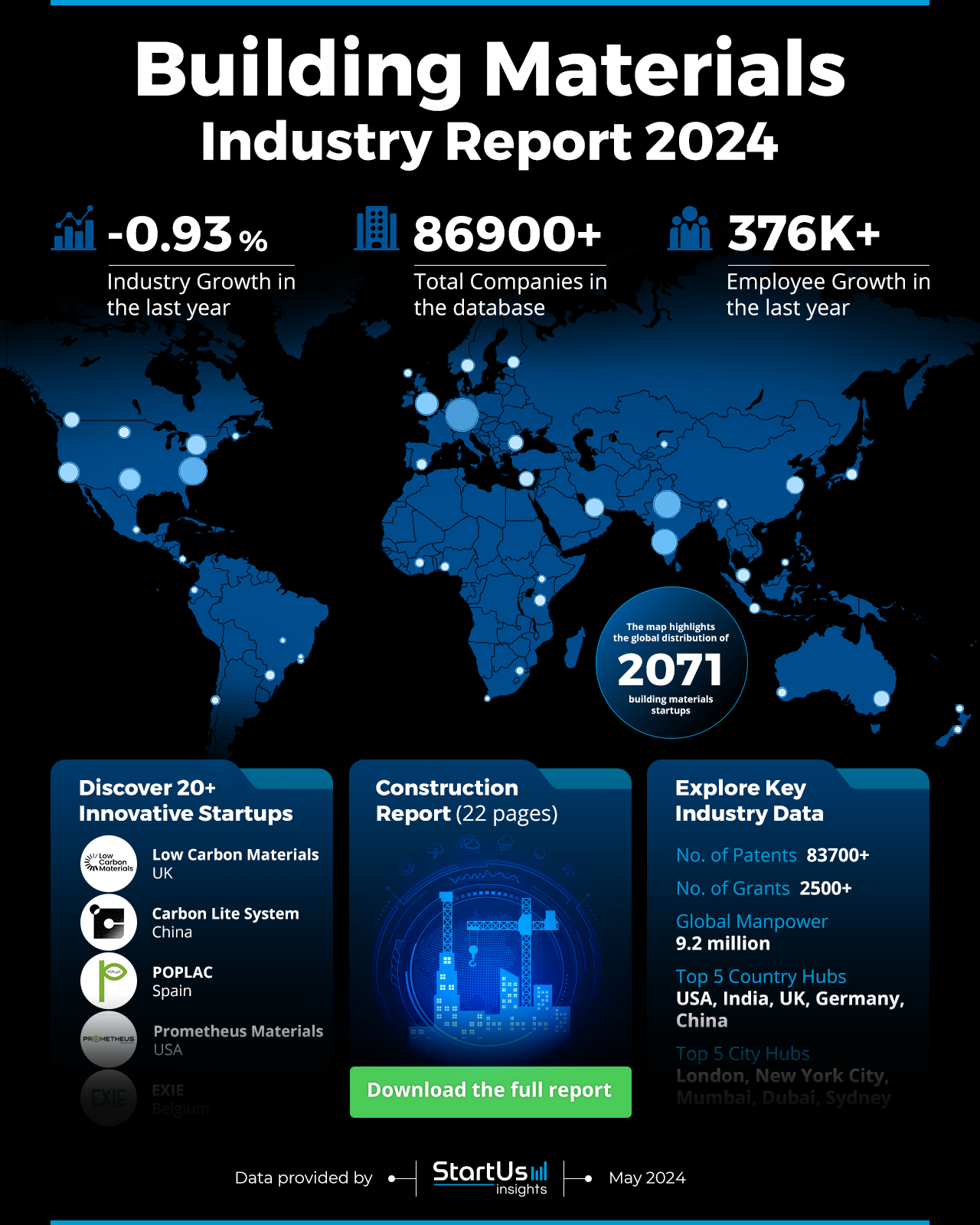The 2024 Building Materials Industry Report provides an overview of the sector’s current landscape, highlighting key trends, innovations, and market data. This report examines investments in companies, emerging startups, and significant technological advancements driving the industry forward. With a focus on sustainability, efficiency, and resilience, the report explores the impacts of regulatory changes and consumer preferences for construction stakeholders.
This report was last updated in July 2024.
This building materials report serves as a reference for stakeholders within the industry, investors, policymakers, and economic analysts, providing a snapshot of the industry’s health to map its trajectory for innovation and growth in the coming years.
StartUs Insights Building Materials Industry Outlook 2024
- Executive Summary
- Introduction to the Building Materials Industry Report 2024
- What data is used in this Building Materials Report?
- Snapshot of the Global Building Materials Industry
- Funding Landscape in the Building Materials Industry
- Who is Investing in Building Materials?
- Emerging Trends in the Building Materials Industry
- 5 Building Materials Startups impacting the Industry

Executive Summary: Building Materials Industry Outlook 2024
This report is created using data obtained from the Big Data and AI-powered StartUs Insights Discovery Platform, covering more than 4.7 million global companies, as well as 20K+ technologies and emerging trends. We also analyzed a sample of 2000+ building materials startups developing innovative solutions to present five examples from emerging industry trends.
- Industry Growth Overview: The building materials industry has over 2560 startups and more than 86900 companies globally, with a slight growth decline of 0.93% last year.
- Manpower & Employment Growth: The industry employs 9.2 million workers globally, adding 376000 new employees in the past year, reflecting its employment capacity.
- Patents & Grants: There are over 83700 patents and 2500 grants in the building materials industry, indicating significant innovation and research activity.
- Global Footprint: Top country hubs include the USA, India, the UK, Germany, and China. Key city hubs in London, New York City, Mumbai, Dubai, and Sydney serve as key centers of startup activity.
- Investment Landscape: The industry has seen substantial investment, with an average investment value of USD 50 million per funding round and more than 9870 funding rounds.
- Top Investors: Top investors include Paycheck Protection Program (USD 47 million), Techstars (USD 2.8 million), Saint Gobain (USD 51 million), and more.
- Startup Ecosystem: Five innovative startups include Low Carbon Materials (Low Carbon Concrete & Asphalt), CarbonLite System (Waste to Graphene), POPLAC (Seaweed Alternative), Prometheus Materials (Bio-concrete), and Exih2.be (Hemp Lime Insulation).
- Recommendations for Stakeholders: Investors should focus on funding startups and projects that emphasize eco-friendly solutions and advanced materials. Entrepreneurs should leverage emerging trends such as circular construction and high-performance materials to create competitive advantages and new business models. Governments must support the industry through favorable policies, grants, and incentives to promote sustainable practices and innovation.
Explore the Data-driven Building Materials Report for 2024
The Building Materials Report 2024 uses data from the Discovery Platform and encapsulates the key metrics that underline the sector’s dynamic growth and innovation. The database comprises over 2560 startups and more than 86900 companies globally. Despite a slight decline of 0.93% in industry growth last year, the sector remains robust with over 83700 patents and 2500 grants.
The industry employs a substantial workforce, with global manpower reaching 9.2 million and an impressive employee growth of 376K+ in the past year. The heatmap above visualizes the distribution of startup activity and other key data points. The top five country hubs leading this industry include the USA, India, the UK, Germany, and China. Major city hubs driving innovation and growth in building materials are London, New York City, Mumbai, Dubai, and Sydney.
What data is used to create this Building Materials report?
Based on the data provided by our Discovery Platform, we observe that the Building Materials industry ranks among the top 5% in the following categories relative to all 20K topics in our database. These categories provide a comprehensive overview of the industry’s key metrics and inform the short-term future direction of the industry.
- News Coverage & Publications: The industry has received significant news coverage and publications, with over 27000 publications in the last year.
- Funding Rounds: Our database records over 9800 funding rounds, showcasing robust investment activity.
- Manpower: The building materials industry employs over 9.2 million workers, adding more than 376K+ new employees last year.
- Patents: With more than 83000 patents, the industry demonstrates strong innovation and intellectual property growth.
- Grants: The industry has secured over 2500 grants, highlighting substantial research and development funding.
- Yearly Global Search Growth: Yearly global search growth for the industry stands at 6.35%, indicating increasing interest and visibility.
A Snapshot of the Global Building Materials Industry
The building materials industry has demonstrated significant activity and growth over the past year, underscored by several key metrics. The industry experienced remarkable employee growth, adding 376000 new employees, contributing to over 83700 companies operating globally. This expansion highlights the sector’s resilience and capacity to generate employment opportunities.
Explore the Funding Landscape of the Building Materials Industry
Investment in the building materials industry has been substantial, with an average investment value of USD 50 million per funding round. The industry has attracted over 4400 investors, reflecting strong confidence in its potential and innovation. There have been more than 9870 funding rounds closed, indicating a high level of investment activity and interest.
Further, more than 4000 companies have received investments, showcasing a broad distribution of funding across various enterprises within the sector. This investment supports the industry’s growth, development, and ongoing innovation, positioning it as a dynamic and evolving field within the global construction economy.
Who is Investing in Building Materials?
The building materials industry has attracted significant investments from top investors, with a combined value exceeding USD 7.6 billion. This substantial financial support underscores the industry’s potential and ongoing innovation. Some of the top investors include:
- Paycheck Protection Program has invested USD 47 million in 35 companies.
- Techstars has supported 24 companies with investments totaling USD 2.8 million, focusing on early-stage innovations.
- Saint Gobain invested USD 51 million in 20 companies.
- Y Combinator has channeled USD 118 million into 17 companies.
- Tiger Global Management made a significant impact with USD 1.4 billion invested in 11 companies.
- Andreessen Horowitz invested USD 1.3 billion in 12 companies.
- European Investment Bank has supported 4 companies with USD 913 million, highlighting its role in funding large-scale projects.
- Sequoia Capital invested USD 425 million in 12 companies.
These investments help fuel technological advancements, sustainability initiatives, and market expansion, contributing to the overall resilience of the building materials sector.
Access Top Building Materials Innovations & Trends with the Discovery Platform
The High-performance Materials segment encompasses 869 companies employing 162,000 individuals, with 5,000 new employees added in the last year. This sector focuses on developing advanced materials with superior properties for enhanced performance in various applications. The annual trend growth rate for high-performance materials stands at 10.11%.
Concrete Technology remains a cornerstone of the building materials industry, with over 32,000 companies involved and employing 2.6 million people. This segment saw an addition of 104,000 new employees in the last year, underscoring its significant labor demand. The annual trend growth rate for concrete technology is 7.42%, reflecting steady advancements and the adoption of new techniques. Innovations in concrete technology, such as self-healing concrete and eco-friendly formulations, are enhancing durability and sustainability.
Circular Construction, focusing on sustainability and resource efficiency, has 115 companies identified in this burgeoning sector. Employing over 27,000 individuals, with 1,700 new employees added in the last year, this area exhibits a remarkable annual trend growth rate of 48.53%. Circular construction aims to minimize waste and maximize the reuse of materials, aligning with global sustainability goals. The rapid growth in this sector highlights increasing industry and regulatory focus on sustainable building practices.
5 Top Examples from 2000+ Innovative Building Materials Startups
The five innovative startups showcased below are picked based on data including the trend they operate within and their relevance, founding year, funding status, and more. Book a demo to find promising startups, emerging trends, or industry data specific to your company’s needs and objectives.
Low Carbon Materials offers Low Carbon Concrete & Asphalt
UK-based startup Low Carbon Materials develops sustainable construction materials to reduce the carbon footprint of the building industry. Their innovative platform, CarbonNeutral, incorporates recycled materials to produce eco-friendly concrete alternatives. The technology behind CarbonNeutral focuses on minimizing greenhouse gas emissions during the production process. This approach significantly lowers environmental impact, enhancing sustainability in construction projects. Their product, CarbonNeutral Concrete, offers high-performance characteristics comparable to traditional concrete.
Carbon Lite System builds Sustainable Carbon Management Technology
Chinese startup CarbonLite System uses waste biomass to create graphene and biochar. Graphene is a very strong, thin, and conductive material that can be used in electronic devices and building materials. Biochar is a charcoal-like material that improves soil and sequesters carbon. CLS is working to develop new products from biochar, such as construction materials that could replace cement. This would help reduce carbon emissions in the construction industry.
POPLAC offers Seaweed-based Building Materials
POPLAC is a Spanish startup that makes building materials from organic waste materials like seaweed. These materials are said to be high-performing, sustainable, and competitive. POPLAC Development’s goal is to create new environmentally friendly building materials. They accomplish this by using a carbonation process that captures CO2.
Prometheus Materials produces Bio-concrete
US-based startup Prometheus Materials develops sustainable building materials using its proprietary bio-cement technology. The company’s technology leverages natural processes to create a carbon-neutral alternative to traditional cement. Prometheus Materials’ bio-cement offers strength and durability comparable to conventional materials while significantly reducing carbon emissions. The company’s innovative approach addresses the urgent need for sustainable construction solutions in the building industry.
EXIE develops Hemp Lime-based Insulation Solutions
Belgian startup Exih2.be develops natural and circular insulation materials. It utilizes the benefits of using hemp and straw for insulation. Hemp and straw are both sustainable, recyclable, and capture CO2. They also provide thermal insulation and moisture regulation. In addition, hemp improves indoor air quality and reduces noise.
Gain Comprehensive Insights into Building Materials Trends, Startups, or Technologies
The 2024 Building Materials Industry Report underscores the sector’s pivotal role in shaping the future of construction and infrastructure. From high-performance materials and concrete technology to circular construction, the report showcases the industry’s commitment to innovation and sustainability. Get in touch to explore all 2000+ startups and scaleups, as well as all industry trends impacting construction companies globally.




![Digital Transformation in Construction: Trends, Benefits, and Future Insights [2025 & Beyond]](https://www.startus-insights.com/wp-content/uploads/2024/12/Digital-Transformation-in-Construction-SharedImg-StartUs-Insights-noresize-420x236.webp)




